#Cymreig
Explore tagged Tumblr posts
Text

PROTEST in PONTYPRIDD on Wednesday thr 26th!!! No time has been set yet, as people are trying to find out still what time these fucks rock up
34 notes
·
View notes
Text
WE DID IT !!!! NOT A SINGLE TORY OR REFORM SEAT IN THE WHOLE COUNTRY !!! CYMRU AM BYTH 💪🏴 RAHHHH 🏴🫶

we will worry about the labour majority later but for now we ride !!!!
(fyi the green seats are plaid cymru not the green party)
#uk elections#uk politics#uk#i'm so proud to be welsh#welsh elections#welsh politics#wales#escxelle#etholiadau cymreig#gwleidyddiaeth cymru#cymru#etholiadau'r du#gwleidyddiaeth y du#dwi mor falch o fod yn gymro
583 notes
·
View notes
Text
#tristwch y fenywod#celtic#occult goth#cerddoriaeth cymreig#occult feminist goth#gothic welsh music#alternative#Leeds#Bandcamp
12 notes
·
View notes
Text

Hi! Hope you’ve had a great week!
I’ve had an exhausting but inspiring Welsh language summer school at Bangor University this week (diolch yn fawr iawn/thank you very much, www.DysguCymraeg.cymru !), so today I just wanted to show you the lambs I saw and sketched last month, while Steve and I were on holiday hiking up Tre’r Ceiri in Pen Llŷn/ the Llŷn Peninsula.
The A5 unframed original is available from me (via private message) for £25, or it’s available printed on lots of lovely things at:
Thanks!
Sam aka LymphomaLass xx
9 notes
·
View notes
Video
youtube
(via Pan Wales / Cymru)
0 notes
Video
tumblr
A great afternoon spent in Pontypridd, enjoying Welsh culture and hospitality and witnessing the power of strong community.
Prynhawn gwerth chweil ym Mhontypridd, yn mwynhau diwylliant a lletygarwch Cymreig a phrofi grym cymuned gref. -- The Prince and Princess of Wales
#catherine elizabeth#princess catherine#princess of wales#princess catherine of wales#catherine the princess of wales#william arthur philip louis#prince william#prince of wales#prince william of wales#william the prince of wales#prince and princess of wales#william and catherine#kensington palace
54 notes
·
View notes
Note
Welsh friend doesn't have Tumblr but she says cymru am byth!!!
CYMRU AM BYTH FFRIND CYMREIG. MAY YOUR LEEKS GROW WELL AND YOUR DAFFODILS SMELL SWEET. 🏴
33 notes
·
View notes
Text
Proud to be Colonel and Colonel-in-Chief of the Welsh Guards and 1st The Queen’s Dragoon Guards. Happy St David’s Day! 🏴
Yn falch o fod yn Gyrnol ac yn Brif Gyrnol y Gwarchodlu Cymreig a Gwarchodlu Dragŵn 1af Y Frenhines. Dydd Gŵyl Dewi Hapus!
- The Prince and Princess of Wales
#prince of wales#princess of wales#St.DavidsDay24#kensingtonroyal#british royal family#1032024#kp twitter
60 notes
·
View notes
Text
🇺🇦 Чи знали ви, що Донецьк і Донбас як промисловий регіон було засновано валлійським підприємцем?
🏴 Oeddech chi'n gwybod bod Donetsk a Donbas fel rhanbarth diwydiannol wedi'u canfod gan entrepreneur o Gymru?
🏴 Did you know that Donetsk and Donbas as an industrial region were found by a Welsh entrepreneur?
🇺🇦 Джон Юз (Г'юз) приїхав у Дикий Степ в 1870х та відкрив кільках металургійних мануфактур, навколо яких виросло місто Юзівка, яке зараз ми знаємо як Донецьк.
Металургійний завод був доволі успішним, туди з Уельсу приїздили працювати висококваліфіковані фахівці разом зі своїми родинами. Однак після більшовицької революції завод було націоналізовано, а більшість валлійських робітників повернулися назад до Уельсу.
🏴 John Hughes came to the Wild Steppe in the 1870s and established metal works, later Hughesovka (Yuzovka), now known as Donetsk, was formed around the ironworks.
The ironworks used to be quite successful, highly qualified engineers with their families had been coming from Wales to work here. But after Bolshevik revolution the manufacture was nationalized and many Welsh workers had to come back to Wales.
🏴 Daeth John Hughes i'r Paith Gwyllt yn y 1870au a sefydlwyd gweithfeydd metel, yn ddiweddarach Hughesofka (Iwsofka), a adwaenir bellach fel Donetsk, o amgylch y gwaith haearn.
Roedd y gwaith haearn yn arfer bod yn eithaf llwyddiannus, roedd peirianwyr tra chymwys gyda’u teuluoedd wedi bod yn dod o Gymru i weithio yma. Ond ar ôl chwyldro'r Bolsieficiaid gwladolwyd y gweithgynhyrchu a bu'n rhaid i lawer o weithwyr Cymreig ddychwelyd i Gymru.
Source of photos: Glamorgan archives
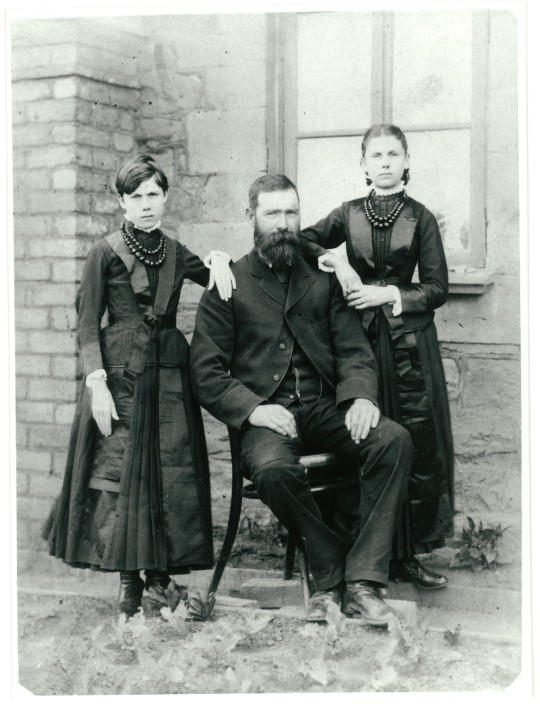





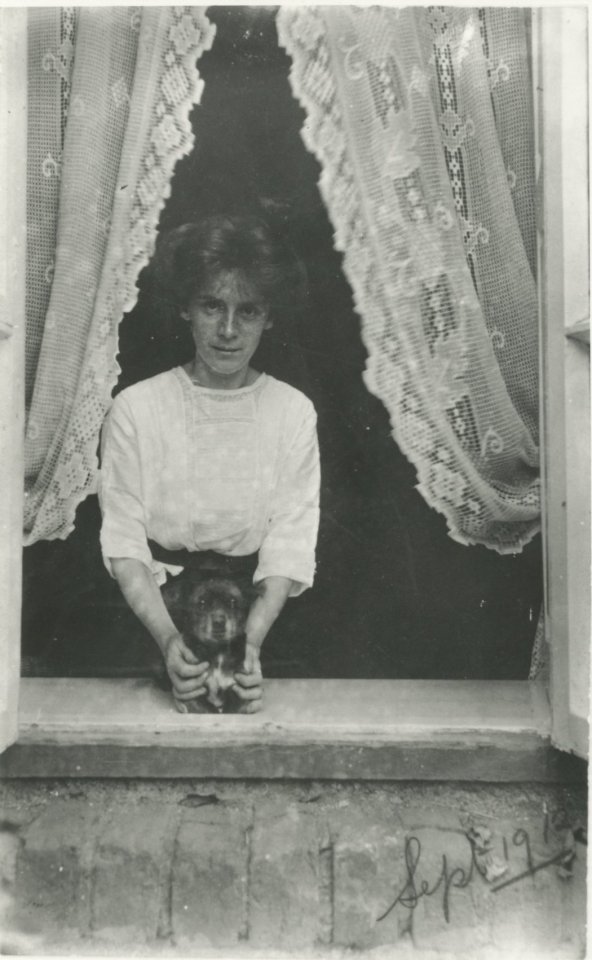

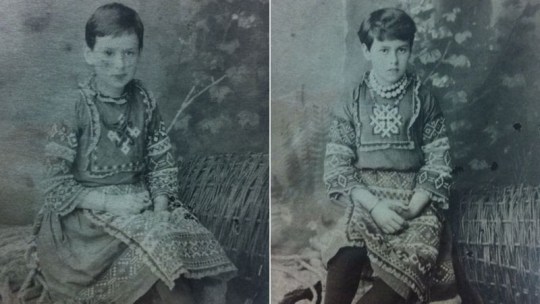
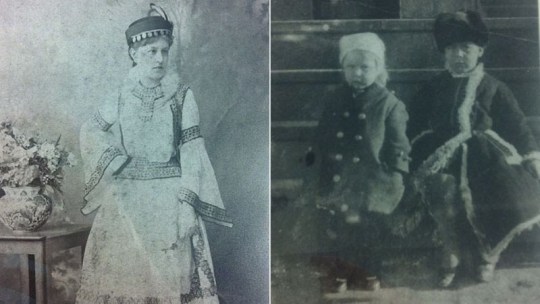
A girl on the last picture - John Hughes'granddaughter wearing supposedly russian peasant costume. It doesn't look like any russian folk costume and I don't know to which culture it actually belongs. Looks like the Chuvash one, but Chuvash in Eastern Ukraine?? I'm confused 😬
157 notes
·
View notes
Text
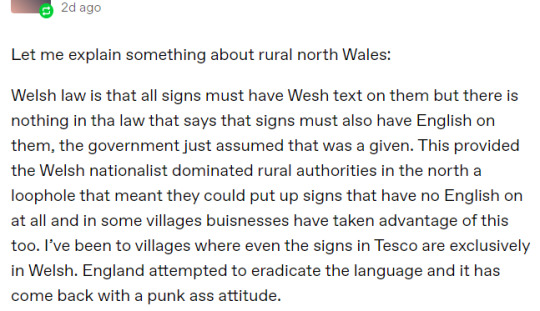
Bad Takes in the Welsh tag vol. II- this reblog on a post about the number of Welsh speakers. (I have cropped out the username of OP and as ever, I only focus on the sentiment, not the person. If you know OP's url kindly do not send them anon hate etc.).
So I saw this take a few days ago in a reblog on a post in the Welsh tag and wanted to address this sentiment as well, since it does the opposite of that other bad take that I saw and made a post about the other day. To be clear, I don't disagree entirely with OP, but there's an element of wishful thinking that I sometimes see when it comes to Welsh / other minoritised languages which can end up doing more harm than good.
This screenshot was also discussed in the LGBTQIA+ Welsh Discord I run and the broad consensus from those of us in there who live in Wales is that OP is painting a very inaccurate picture of the status of Welsh, particularly of Welsh in North Wales. It is frustrating when you have people who value Welsh, but don't value Welsh enough to bother with accuracy in their promotion of the language. This post is intended as a gentle reminder that we can fight for the Welsh language without misrepresenting the situation on the ground so to speak.
The post itself has a 'fuck yeah, Welsh!' attitude which I personally love. But sadly this particular post is riddled with misinformation. First of all, we have "Welsh law is that all signs must have We[l]sh text on them but there is nothing in the law that says signs must also have English on them". Now the wording is kinda vague here- but I'm going out on a limb and saying that the OP is likely referencing The Welsh Language Standards Guidelines (which have been updated several times over the years). The guidance has a number of Standards relating to signs in the Welsh language, such as Standard 32, Standards 47-52, Standard 66 and Standards 111-113. The section of Interpreting the Standards also contains relevant text, such as in Part 3- Interpreting the Standards article 15:

Plain text: "For the purposes of the standards a requirement to publish, provide or display any written material in Welsh does not mean that material should be published, provided or, displayed in Welsh only, nor does it mean that the material should be produced in Welsh first (unless that is specifically stated in the standard)"
Of the Standards listed above, Standards 47-52 are specifically designated as Standards relating to signs and notices displayed or published by a body. Which state things like "... if the same text is displayed in Welsh and in English, you must not treat the Welsh language text less favourably than the English language text" - Standard 47 and "You must ensure that the Welsh language text on signs and notices is accurate in terms of meaning and expression" - Standard 49.
Anyway, back to the point. OP is incorrect in stating that there is a loophole by which the Welsh Law forgot to specify that the signs had to have English as well as Welsh and that public bodies can get away with monolingual Welsh signs. This just isn't true. Important to note is that the law is intended for public bodies- so big companies, road signage makers etc. This guidance isn't for random farms in North Wales which have signs that say "wyau <-" pointing up the lane with no English translation.
Now, the next sentence is a little loaded, well-meant, but a little loaded nonetheless. "The Welsh nationalist dominated rural authorities in the North"- it's loadedness comes down to its vagueness I think. While it isn't wrong per se that Welsh Nationalist parties like Plaid Cymru do well in the North West, it is a little skewed to ascribe Welsh speaking status to whichever party is doing the best in a given area. It isn't that clear cut, unfortunately. To get into this issue, we have to talk maps.
So those Welsh speaker maps that have nice gradients and have the West of Wales coloured in dark, gradually getting lighter as you move East? Unfortunately, these maps can be very misleading (especially if, like in the map OP was commenting on, the source of the data was left off). But the long and short of it is- these maps tend to imply that Welsh is exclusively spoken in the NW and that everywhere East of Bangor has had it. But the data presentation is very flawed, since it tends to erase Welsh language gains in places like Cardiff, Swansea and Monmouthshire.
You've all seen maps like this right? NW in the darkest colours and SE in the lightest?
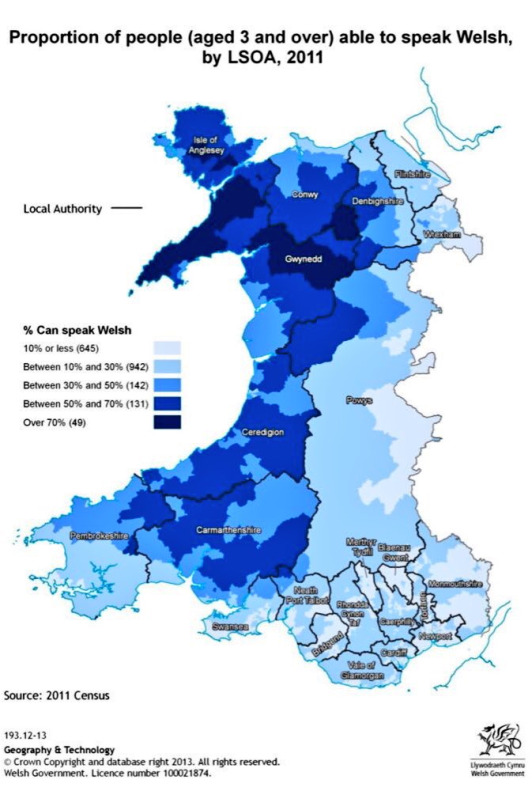
Unfortunately when it comes to these kinds of maps, they can be very misleading from a language revitalisation point of view.
Here's some maps I actually studied at undergrad for this purpose

On the face of it, your eyes zip up to Gwynedd and Môn on the first map and then over to the second and- 'oh no!' you might say, there's been a -2.1 to -4.0 percent decline in Welsh speakers in those areas. And of course, this is something that language revitalisation wants to address. But look at the first map again. Look at, Monmouthshire, Caerphilly, Cardiff and Swansea. Then look at the second map.
Welsh speaking is actually being increased in these areas, between 2001 to 2011.
The misleading nature of a language map like this one is not its borders, its colour or key, but its omission of the sociopolitcal forces at play in language revitalisation. Large population centres like Cardiff, Caerphilly, Newport and Swansea are actively gaining more Welsh speakers. While Gwynedd and Môn are losing some. But Welsh speaking (despite a few wobbles) is on the increase. So where did those Welsh speakers from the North go?
South.
It isn't a hard-and-fast rule, but many rural Welsh speakers (especially those who live in areas with high amounts of holiday homes which drive up rent/cost of staying in villages in North Wales) actually end up moving to more urban areas in the South, meaning that some of the decline of Welsh speaking in North Wales is down to Welsh speakers just, moving to a different part of Wales- which in turn makes those areas see an increase in Welsh being spoken.
Of course, we actually have to address the cause of the exodus of Welsh speakers from rural areas holiday homes raising house prices making them unaffordable for locals and drives them away but the way that our data is represented is not as dire as it looks. Still not great, mind, but not apocalyptic either.
Then there's the other inaccuracies in this post. Small businesses like farm shops, high street businesses and houses can have Welsh-only signage because they are not local authorities and much of the guidance indirectly referenced by OP mostly only applies to local authorities. This is how you have farm shops advertising produce in Welsh only, or shop names in Welsh (such as Siop y Pethe and Broc-Môr in Aberystwyth) or the name of the house my flat is in. Businesses have different regulations for signage inside the shop in different situations. But the guidance indirectly referred to by OP in the screenshot mostly applies to road signage.
Big name brands such as Tesco are definitely not going to have monolingual Welsh stores and it is disinformation to suggest that they do- especially not when they've made gaffes such as "sboncen" to mean squash (the drink). "Sboncen" means squash (the sport), while they should have put "sgwash", meaning the drink.
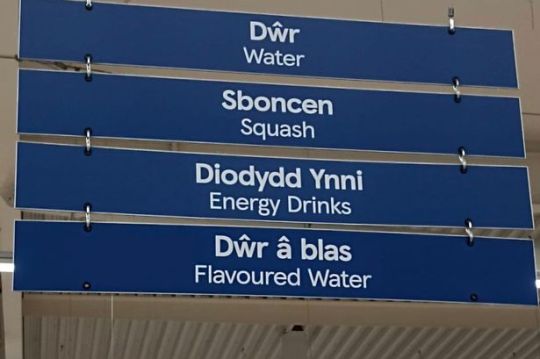
Or my favourite instance of these "arwyddion gwael", in which instead of offering a free ATM service, this ATM on the Tesco Express in Aberystwyth offered "codiad am ddim" (free erections):

So I dread to think what a fully monolingual poorly translated Welsh Tesco would look like.
I don't disagree with OP on the final part, that we should celebrate Welsh's "punk ass attitude" in surviving despite attempts to eradicate it from existence. But spreading false information is definitely not the way we should be doing that.
Instead, we can celebrate things like the National Eisteddfod coming to places like Wrecsam in 2025, which aren't typically selected due to there being fewer speakers. But what bringing the National Eisteddfod to areas with low-speakers does is reestablish that yes, actually, Welsh deserves to be spoken all over Wales, not just in Y Fro Gymraeg (Welsh concept equivalent of the Gaeltacht in Ireland). It's an active, real reclamation of areas previously lost for Welsh and revitalising them by bringing the language back with the biggest Welsh language event anywhere.
223 notes
·
View notes
Text
Has anyone on here gone to trade college (or whatever the piss) in wales
Can anyone tell me how this stuff works?
3 notes
·
View notes
Text
TAYLOR SWIFT YN EI CYFNOD CYMREIG!!!
SHE SPOKE WELSH AT HER CARDIFF SHOW OMFG! LETS GO CYMRU 🏴🏴🏴
#this is so important to me#growing up in america most people had absolutely no idea where wales was on a map#they’d just tell me my dad has a british accent and i’m like ‘he’s welsh’#and they’d be like what ??#so having one of the biggest pop stars in the world speak welsh is everything#especially since the welsh language has become spoken less and less over time#taylor swift#the eras tour#cardiff#wales#cymru
2 notes
·
View notes
Text

Y Brenin Siarl III,
Prif Gyrnol y Gwarchodlu Cymreig.
King Charles III,
Colonel-in-Chief, the Welsh Guards.
trwy’r / via BBC
2 notes
·
View notes
Text
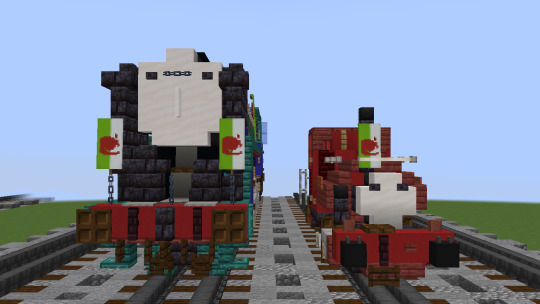




Morgan and Skarloey celebrating Saint David's Day
Dydd Dewi Sant Hapus Pawb! Rwy'n dod o Gymru, a heddiw yw Dydd Dewi Sant. Adeiladais fy OC Morgan, sy'n hanu o Gaerdydd, y capitol Cymreig, a Skarloey, am resymau amlwg.
Happy Saint David's Day, everyone! I'm from Wales, and today is St David's Day. For obvious reasons, I built my OC Morgan, who hails from Cardiff, the Welsh capital, and Skarloey.
#thomas the tank engine#minecraft#minecraft build#thomas and friends#trains#ttte oc#ttte skarloey#wales#welsh#cymru#cymraeg
6 notes
·
View notes
Text
Eurovision Fact #402:

In 1969, Wales tried to enter the Eurovision Song Contest, starting their own national selection competition called Cân i Gymru. However, since Wales is not an independent nation, they were not allowed to enter the competition.
Had they been allowed to compete, Margaret Williams would've represented Wales with her song 'Y Cwilt Cymreig.'
Cân i Gymru is still held annually in March.
[Sources]
'Lle oeddwn i: Margaret Williams, Cân i Gymru 1969,' BBC.com.
'Eurovision: How come Wales is not represented?' nation.cyrmu.
7 notes
·
View notes
Text
I was writing this in the tags but I have too much to say.
So this absolutely. Don’t unwelsh my Mari Lwyd please and thank you
BUT I’d like to add some more:
As someone completely guilty of using the phrase ‘Welsh rap battle’ over pwnco. It’s because it’s one, a joke phrase I used to use even before it became more widely recognised, and two a more understandable concept I can explain to people without boring them with rhyme and meter.
I love my rhyme and meters, so trust me I knew how the pwnco worked when I use this phrase. I like saying ‘Welsh Rap Battle’ because I think it’s funny and emphasises how cool and charming I find my own cultural tradition to an English speaking person who wouldn’t know the tradition. It’s good to alter your language for people’s ease of understanding, it’s unfortunate that the joke caught on to people who don’t understand the pwnco. (And there is a limit to changing your language: it eventually does become altering something important too much for someone’s benefit).
I will also note here, while I use the phrase ‘Welsh rap battle’ to reinforce that I like the tradition, I also know people who were ashamed of the culture and tradition and used that phrase to make fun of the dead singing horse (same issue with Scots being called a dialect: cultural shame is a big issue in Wales even if we don’t think it is). Now the tradition is being reclaimed I doubt those people still see it as something to be ashamed of. But it’s something to keep in mind when using that phrase. Intentions do vary.
But my main point I wanted to adress:
Dysgais i Cymraeg fel iaith yn ail felly dw i ddim yn siarad cymraeg yn digon rhugl i fyrfyfyrio pwnco. Dw i’n gallu creu cerdd gydag amser ond beth am y bobl (cymreig) sydd ddim yn gallu siarad cymraeg o gwbl?
So while we don’t want to remove the Welsh from our tradition, we definitely don’t want to make the tradition inaccessible to our own people.
Learning a language is difficult. The education system sucks. Welsh second language a level is torture (I’d know, I did it. Average AS result in my class was a U, it was that awful). And not everyone has the means or the opportunity to learn Welsh so we should take care never to ostracise our own people. It’s more than unfortunate that we don’t all have a good grasp on the language. So having a set Cân-y-Fari that non-speakers or dysgwyr can learn and recite helps to both immerse them in Welsh and includes them in their own culture. Same with having art or an aesthetic. Maybe you can’t speak Welsh: but you can draw. That gives you a way to celebrate your culture still and I think that’s awesome. Even in English I couldn’t improvise a poem with a strict meter. The actual tradition of the Mari Lwyd is a seemingly unattainable level of fluency to most dysgwyr.
Obviously this still needs to coexist with the original Welsh tradition (not necessarily art though, if it’s a drawing of a Mari Lwyd then it’s a drawing of a Mari Lwyd. In my opinion art doesn’t need words unless the artist wants to add words). Traditions do change and that isn’t always a bad thing. In this case it’s not something we want to do, but it’s something we need to consider doing in order to help the non-Welsh speakers and dysgwyr be included in their culture.
There is an even larger issue here to be addressed with how we treat our own people as not ‘Welsh’ enough. Especially people who have mixed heritage. There’s a big racism issue that I could unpack here as well where non-white welsh students are made not to feel Welsh enough to deserve to be involved in welsh culture. Which should not happen. Similarly with half English Welshies. We need to stop treating ourselves like we aren’t Welsh enough; it only hurts us to be denied by our own people.
And as for Krampus comparisons, I bonded with a German friend over our different but similarly unique cultural Christmas traditions so I think that’s good too. I guess it’s the simplification of it that’s the problem
So I hate how the Mari Lwyd has been ‘de-welshed’. But personally, the ability for all of Welsh people to have access to it also needs to be considered in this discourse.
Still if the tradition completely shifted to English I would be so livid.
Edit: forgot to say, while I know the Mari Lwyd isn’t a cryptid, it is a cultural creature and I see no issue with people using that aspect of the tradition as a way to connect to it. The tradition isn’t only changing, it’s expanding. We just have to make sure it doesn’t drown out the original tradition
The thing with the Mari Lwyd, though, is that it's being... I don't know, 'appropriated' is the wrong word, but certainly turned into something it isn't.
Thing is, this is a folk tradition in the Welsh language, and that's the most important aspect of it. I feel partly responsible for this, because I accidentally became a bit of an expert on the topic of the Mari Lwyd in a post that escaped Tumblr containment, and I clearly didn't stress it strongly enough there (in my defence, I wrote that post for ten likes and some attention); but this is a Welsh language tradition, conducted in Welsh, using Welsh language poetic forms that are older than the entire English language, and also a very specific sung melody (with a very specific first verse; that's Cân y Fari). It is not actually a 'rap battle'. It's not a recited poem. It is not any old rhyme scheme however you want.
It is not in English.
Given the extensive and frankly ongoing attempts by England to wipe out Welsh, and its attendant cultural traditions, the Mari is being revived across Wales as an act of linguistic-cultural defiance. She's a symbol of Welsh language culture, specifically; an icon to remind that we are a distinct people, with our own culture and traditions, and in spite of everyone and everything, we're still here. Separating her from that by removing the Welsh is, to put it mildly, wildly disrespectful.
...but it IS what I'm increasingly seeing, both online and in real world Mari Lwyd festivals. She's gained enormous pop-culture popularity in recent years, which is fantastic; but she's also been reduced from the tradition to just an aesthetic now.
So many people are talking/drawing about her as though she's a cryptid or a mythological figure, rather than the folk practice of shoving a skull on a stick and pretending to be a naughty horse for cheese and drunken larks. And I get it! It's an intriguing visual! Some of the artwork is great! But this is not what she is. She's not a Krampus equivalent for your Dark Christmas aesthetic.
I see people writing their own version of the pwnco (though never called the pwnco; almost always called some variant on 'Mari Lwyd rap battle'), and as fun as these are, they are never even written in the meter and poetic rules of Cân y Fari, much less in Welsh, and they never conclude with the promise to behave before letting the Mari into the house. The pwnco is the central part to the tradition; this is the Welsh language part, the bit that's important and matters.
Mari Lwyd festivals are increasingly just English wassail festivals with a Mari or two present. The Swansea one last weekend didn't even include a Mari trying to break into a building (insert Shrek meme); there was no pwnco at all. Even in the Chepstow ones, they didn't do actual Cân y Fari; just a couple of recited verses. Instead, the Maris are just an aesthetic, a way to make it look a bit more Welsh, without having to commit to the unfashionable inconvenience of actually including Welsh.
And I don't really know what the answers are to these. I can tell you what I'd like - I'd like art to include the Welsh somewhere, maybe incorporating the first line of Cân y Fari like this one did, to keep it connected to the actual Welsh tradition (or other Welsh, if other phrases are preferred). I'd like people who want to write their version of the pwnco to respect the actual tradition of it by using Cân y Fari's meter and rhyme scheme, finishing with the promise to behave, and actually calling it the pwnco rather than a rap battle (and preferably in Welsh, though I do understand that's not always possible lol). I'd like to see the festivals actually observe the tradition, and include a link on the booking website to an audio clip of Cân y Fari and the words to the first verse, so attendees who want to can learn it ahead of time. I don't know how feasible any of that is, of course! But that's what I'd like to see.
I don't know. This is rambly. But it's something I've been thinking about - and increasingly nettled by - for a while. There's was something so affirming and wonderful at first about seeing the Mari's climb into international recognition, but it's very much turned to dismay by now, because she's important to my endangered culture and yet that's the part that everyone apparently wants to drop for being too awkward and ruining the aesthetic. It's very frustrating.
#Mari Lwyd#wales#Cymru#I might be focussing on points where I disagree with the original post#but I definitely agree with the post#I wanted to just add this because I think it’s incredibly important
17K notes
·
View notes